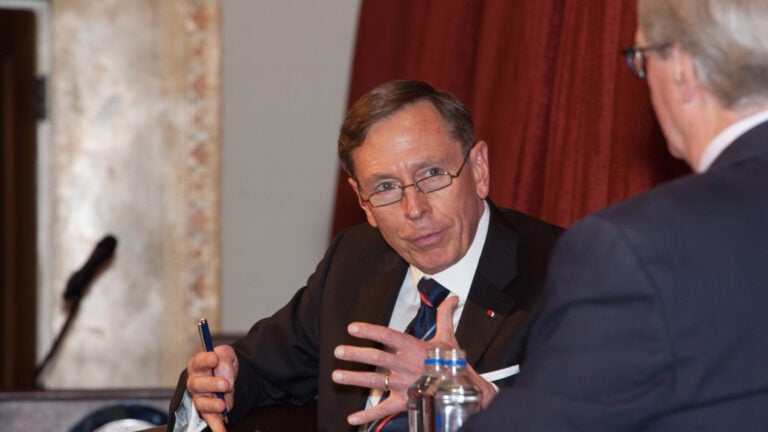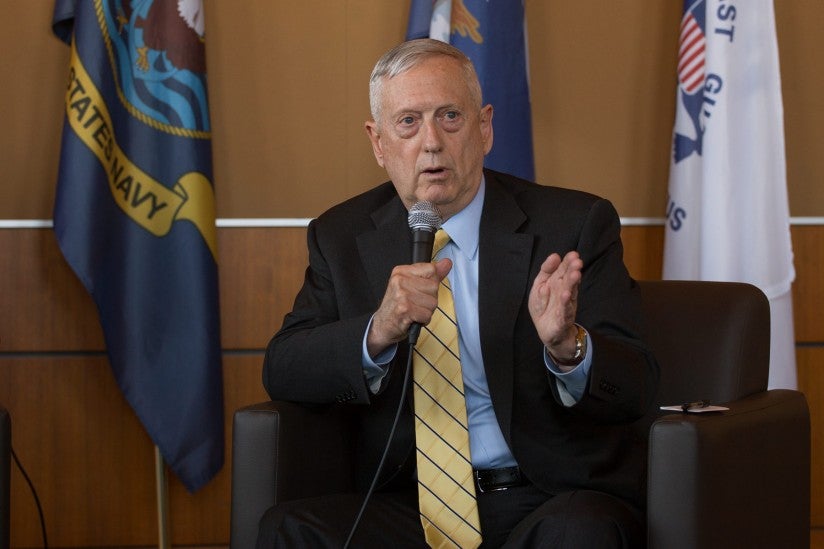
Gen. David H. Petraeus joined USC Price Professor David Sloane for a discussion on the Iraq War. (Photo/Ruben Shaverdyan)
Petraeus discusses Iraq War, counterinsurgency during USC Price visit
The former military leader reflects on his command of coalition forces during that pivotal chapter in American history
Retired Gen. David H. Petraeus shared insights into the U.S. military’s challenges and achievements in Iraq, rewriting the book on counterinsurgency operations, the continuing fight against ISIS and what’s in store for the region during a series of events at USC.
A Judge Widney Professor with a joint appointment at the USC Price School of Public Policy, Petraeus spoke about his command of coalition forces during the surge in Iraq in a conversation with USC Price Professor David Sloane.
“Today is really a firsthand opportunity to learn from a renowned military leader with vast experience in foreign policy and international relations,” USC Price Dean Jack H. Knott said. “The Iraqi War is undeniably a pivotal chapter in our history. Even today, the shadow of those events endures.”
Managing conflicts
USC students, alumni, faculty and community members packed the Town and Gown ballroom in late March to hear the general speak about what Sloane presented as a controversial war, noting that there were men and women in the audience who fought in Iraq, as well as men and women who opposed the war.
When the general and I began talking about this evening, his hope and my hope was to help us all better understand the war and its consequences, especially during this critical political year.
David Sloane
“This evening is about what it was like for Gen. Petraeus to be in Iraq, lead troops into battle, manage political conflicts at home and military ones abroad, and do so knowing many politicians and fellow military leaders were at best skeptical of the strategies he was promoting,” Sloane said. “… When the general and I began talking about this evening, his hope and my hope was to help us all better understand the war and its consequences, especially during this critical political year.”
Petraeus expressed that his own feeling going into the war was similar to that of an emergency medical technician. He wasn’t wishing for an accident to demonstrate his prowess, but if there was one, he wanted to be there to pitch in.
Once the war began and the U.S. military was tasked with taking Baghdad, he felt that they were going in with too few troops to impose order once the Iraqi regime collapsed and without a plan on what to do when they got there. He said he brought this up to command and was told, “You don’t worry about that, you get us to Baghdad and we’ll take it from there.”
When Petraeus was promoted to command of coalition forces early in 2007, violence had been rising dramatically in Iraq as U.S. troops were caught in the middle of a brewing civil war. Between deployments, he collaborated with Marine Gen. James N. Mattis and a team at the U.S. Army Combined Arms Center to write a field manual on counterinsurgency operations now widely known as The Petraeus Doctrine.
“When I came back, I was convinced that we had a doctrinal void in the Army and also had a sense that it was at the Marine Corps as well,” Petraeus said. “I had been [in Iraq] for two and a half years and realized we had some serious shortcomings in how we were preparing our units, leaders and troopers to go to war.”
Fueling a ‘surge in ideas’
Mattis, who went on to follow Petraeus as head of U.S. Central Command, joined Petraeus at USC on March 31 for a discussion on the field manual, which was implemented in the surge of forces led by Petraeus in 2007.

“One chapter we really wanted was how do you define a problem before you start to solve it,” Mattis said. “The idea that we would not again invade a country, get to its capital, then look at each other and say, ‘Now what do we do?’ And that’s basically what we had gotten ourselves into with Iraq.”
The surge was successful in driving violence in the region down by nearly 90 percent. Although the surge did include an increase in troops, Petraeus indicated that the change in strategy had the most impact.
The field manual stressed the importance of stability operations to cement the progress made by offensive operations. Big ideas included going back into the cities and securing people by living with them, stopping the transition to Iraqi security forces because they couldn’t handle the level of violence and an effort to reconcile with as many of the insurgents as possible because it’s not feasible to kill or capture your way out of an industrial strength insurgency.
“The surge that really mattered was the surge in ideas,” Petraeus said.
After U.S. troops withdrew from Iraq at the end of 2011, Petraeus said that Iraqi Prime Minister Nouri al-Maliki undid their progress by pursuing catastrophic sectarian actions, leading to the rise of ISIS. He indicated that efforts dealing with ISIS need to be led by Americans — but not with American troops — and in a coalition with Islamic partners.
He noted that ISIS has used social media to a transformative effect, creating a new battlefield in which the U.S. has to compete. Petraeus said the best way to hinder the recruitment of ISIS is to demonstrate the organization is losing, which he thinks is already beginning to take place.
Petraeus’ final message was that citizens have to recognize that this will be generational warfare.
“We may put a stake through the heart of some individual elements, some individual leaders, but we’re not going to kill ideas that are still going to attract certain individuals and be problems for a very long time until we get at some of the root causes of these ideas,” Petraeus said.



